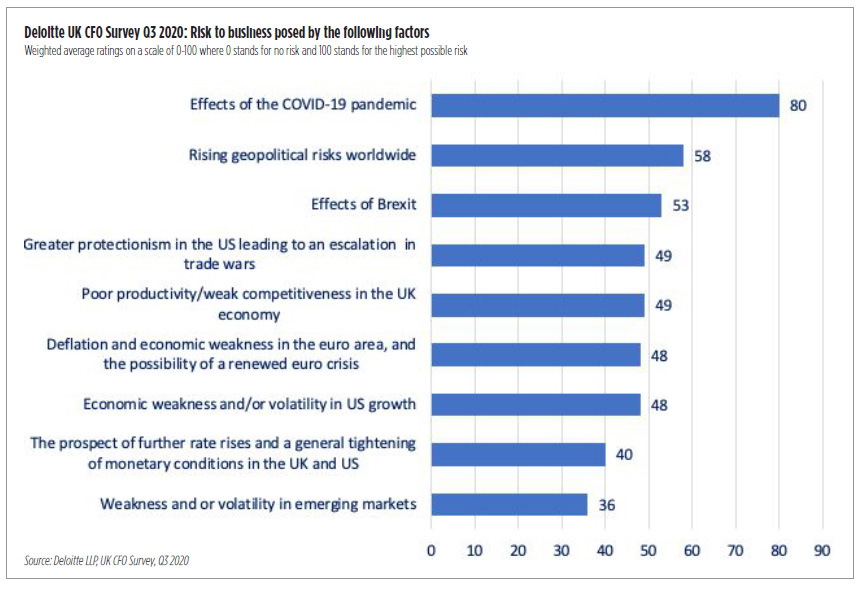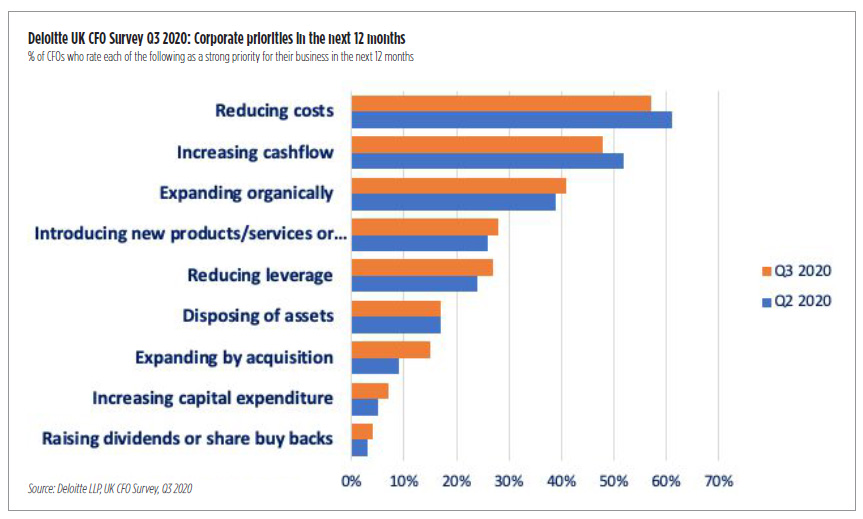Crisis response in the time of COVID: How accessing a global network provides value for your business
This article appeared originally in WMRE.
Whether in the United States or Europe, the coronavirus thrust businesses across the globe into new ways of operating and the pandemic has since dwarfed all other concerns. Relationships with our colleagues, clients, and customers, became 100 percent virtual. As a result, the way in which businesses now interact within workplaces, source from manufacturers, and supply customers, has changed significantly and in many cases, irreversibly.
The latest Deloitte survey of CFOs highlights their opinion of the order of risks posed by events across the world. Not surprisingly, the pandemic is the most critical.
Many businesses have thrived in this crisis, while others have gone into defensive mode. For the latter, Deloitte reports cost reduction as a top priority, alongside an increased focus on efficient utilization and optimization of real estate assets and, for some, a reduction in CapEx spend.
As businesses went in survival mode, real estate advisors responded quickly to provide support. Across the SIOR Global Network, we have seen our members respond to clients who have experienced success and clients who have faced enormous challenges. In both cases members have relied on the significant counsel, resources and data provided by their SIOR colleagues.
At both DeVono cresa and Sentry Commercial, we quickly responded by putting additional support structures in place to assist our clients. Being mindful that decisions made in haste and without context and data can have adverse long-term consequences.
These additional services have included the following:
- Business consultation, including high level insight to portfolio optimization
- COVID-19 FAQ guidance
- Acquisition of government and state support
- Cashflow preservation guidance, including rent deferral, blend and extend lease negotiations, and operating expense savings
- Sector by sector “back to work” guidance
- Risk assessment
- Workplace design and layout assistance, including the ever-evolving design of the “post-COVID” office
The pandemic has forced CRE companies to review the way they function and the services they provide. Top of the list is CRE’s online capabilities and technological platform. The industry, a notorious laggard in tech adoption, has advanced its tech utilization over the past seven months. From CRMs to use of data and analytics, to technology used to maximize facility and property functionality. Many CRE service providers are turning to technology to drive value for employees and clients.
But questions remain about the long-term effects of the pandemic. In our opinion the biggest global question is the pandemic’s long-term effect on the office market. Work-from-home has opened the door for many changes in corporate office plans, which can include design changes, required amount of necessary office space, or the basis of occupation.
Flexible office leasing, once seen as something exclusively for start-ups and small businesses, today, it transcends many industries and sectors. As a part of the re-evaluation of the office that we’re seeing, there is a growing appreciation of the way flexible office solutions provide a means of addressing market uncertainty and controlling fixed and medium-term costs. Ultimately, the goal is to deliver quality collaborative environment whilst achieving flexibility and a balance of “tenure” within a property portfolio.
As we move forward into 2021, CRE pros have the skills, data, and technology required at our fingertips to provide well-informed counsel. Couple this with the support of colleagues in the industry, including our fellow SIOR’s, we will be able to provide our clients with the advice necessary to make sound, informed decisions that will successfully guide their companies through this pandemic and beyond.
By Mark Duclos and Paul Danks
